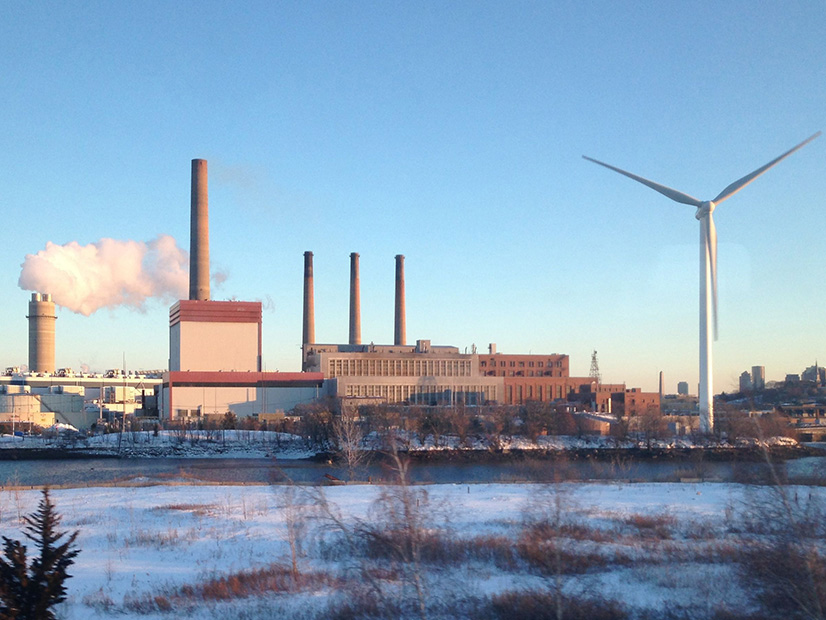
Environmental and clean energy advocates are pushing New England to get off the gas.
In a new white paper and at a press briefing, several regional and national environmental groups challenged the approach taken by grid operator ISO-NE as industry stakeholders head into a high-profile policy forum in Vermont this week.
The groups, which include the Sierra Club, Conservation Law Foundation, Acadia Center and others, say that New England needs to quickly pivot to clean energy, and avoid throwing “good money after bad” by investing more in fossil fuel infrastructure.
The document lays out several clean grid reliability solutions that can be pushed to the front in the short term, including expanding residential demand programs, ramping up commercial and industrial demand response, and boosting energy efficiency.
And it calls on the region to, in the long term, better utilize the existing fleet of renewables, deploy “stacked” battery storage, and make “smart expansions” to the region’s transmission system.
Amid increasingly frequent warnings about the reliability of the region’s grid in winter, New England has clean options, the groups conclude.
“New England’s leaders, with the support of federal agencies like FERC, should be accelerating efforts to deploy alternatives to gas generation that take advantage of the region’s abundant clean energy resources,” the white paper says.
The policy paper was a response to a recent statement put out by ISO-NE, in which the grid operator took a different view.
In its “problem statement” ahead of the FERC forum in Vermont, ISO-NE emphasized that even though the region is moving toward a decarbonized grid in the long-run, natural gas remains a vital generating fuel in the near term. (See ISO-NE: Reliability Still Depends on Mass. LNG Import Terminal)
“Without adequate gas, the region may not be able to meet the demand for home heating and electricity — and, when reliability suffers, the clean energy transition suffers,” the grid operator wrote.
Though all involved agree that New England is moving toward weaning itself off gas in the long run, the grid operator’s message rankled some of its most frequent critics in the environmental and clean energy sectors, who blame ISO-NE for the region’s current reliability travails.
“For years we’ve been presented by the ISO with programs and policies that did not solve any of the perceived winter reliability challenges,” said Phelps Turner, senior attorney at the Conservation Law Foundation, at a press briefing Tuesday.
“It’s our view that if we had spent that time working on the clean energy transition, rather than constant annual fear-mongering, we would be in a much better spot today,” Turner said.
It’s a recurring message from environmental advocates, who feel that ISO-NE has moved far too slowly in following the directives of the New England states to shift to clean energy.
In that vein, the problem statement followed a familiar pattern, said Melissa Birchard, director of clean energy and grid transition at the Acadia Center: It led with identifying clean energy for the region’s long-term needs but then switched to a focus on fossil fuels in the short-term.
“We need to get off this merry-go-round,” Birchard said. “We can’t keep going through this every year and having these incredible costs that consumers are experiencing.”
Managing expectations for Thursday
The all-day forum scheduled by FERC for Thursday in Burlington, Vt., isn’t expected to produce consensus.
“They’re going to be discussing challenges and not solutions. What are the problems and how do we fix them?” said Mireille Bejjani, an organizer on the Fix the Grid campaign.
But getting a wide variety of speakers and guests in the same room could be a start to more productive conversations about how to move forward, said Caitlin Marquis, director of Advanced Energy Economy.
“We want to see a clear and transparent discussion about what the reliability risks are that we’re facing, specifically,” Marquis said. “What is the time frame of those risks? What are the grid’s needs that we need to be defining?”
In the natural gas sector, there are different hopes for the meeting.
A group of associations representing gas and oil generators and pipeline owners called on New England to build more pipelines and tweak market rules to give generators more certainty.
“We hope this forum will provide an avenue to discuss market design improvements and to develop sufficient natural gas infrastructure for power customers in addition to the manufacturers, businesses, and households that rely on natural gas to power their everyday needs,” the groups said in a statement.


